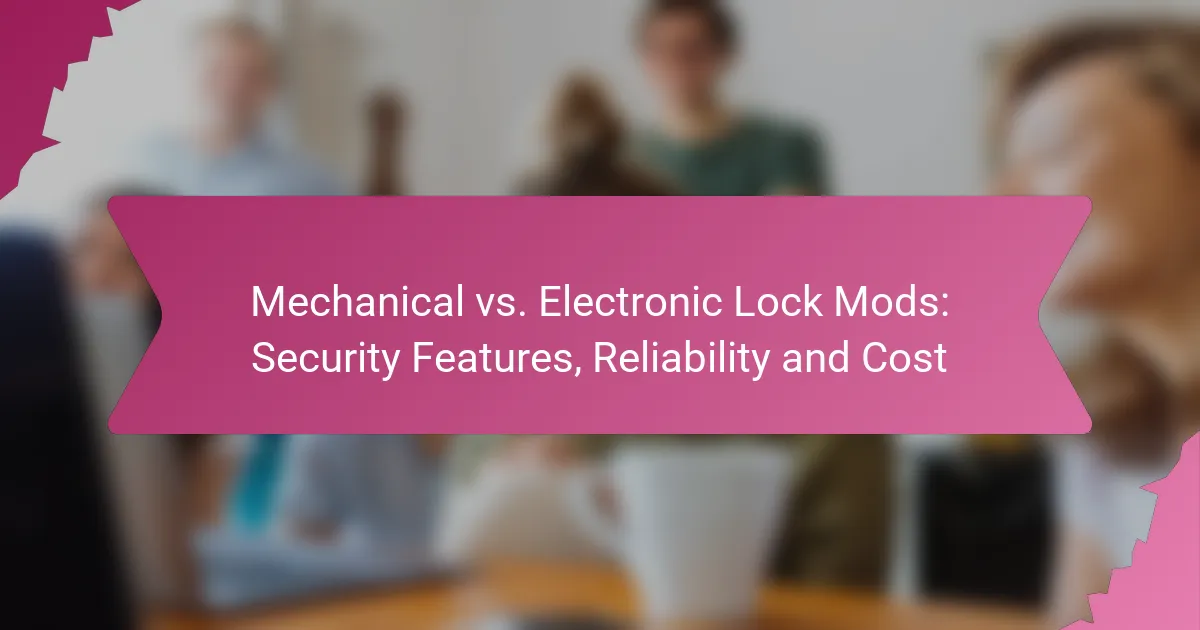When comparing mechanical and electronic lock modifications, it’s essential to consider their security features, reliability, and cost. Mechanical locks provide a straightforward and reliable means of access control through physical keys and intricate mechanisms, while electronic locks offer advanced options like keypad entry and biometric access for enhanced security. Understanding these differences can help in selecting the right locking system for your needs.

What are the security features of mechanical locks?
Mechanical locks offer several security features that make them reliable for safeguarding property. They typically rely on physical keys and intricate internal mechanisms, providing a straightforward yet effective means of access control.
Key-based access control
Key-based access control is a fundamental feature of mechanical locks, allowing only individuals with the correct key to gain entry. This system can be easily managed by changing locks or rekeying them when keys are lost or when personnel changes occur.
For enhanced security, consider using high-security keys that are difficult to duplicate. These keys often have unique designs or require special equipment for cutting, making unauthorized copies less likely.
Resistance to picking
Mechanical locks are generally designed to resist picking attempts, thanks to their complex internal pin and tumbler mechanisms. High-quality locks may incorporate additional features like spool pins or mushroom pins, which further complicate the picking process.
To maximize resistance to picking, invest in locks that meet industry standards, such as those certified by ANSI or UL. These locks have undergone rigorous testing to ensure they can withstand tampering and unauthorized access.
Durability and longevity
Mechanical locks are known for their durability and longevity, often lasting many years with minimal maintenance. They are typically made from robust materials like brass or hardened steel, which can withstand wear and tear from daily use.
Regular maintenance, such as lubrication and inspection, can extend the lifespan of these locks. Avoid exposing them to harsh weather conditions or excessive moisture, which can lead to rust and malfunction over time.
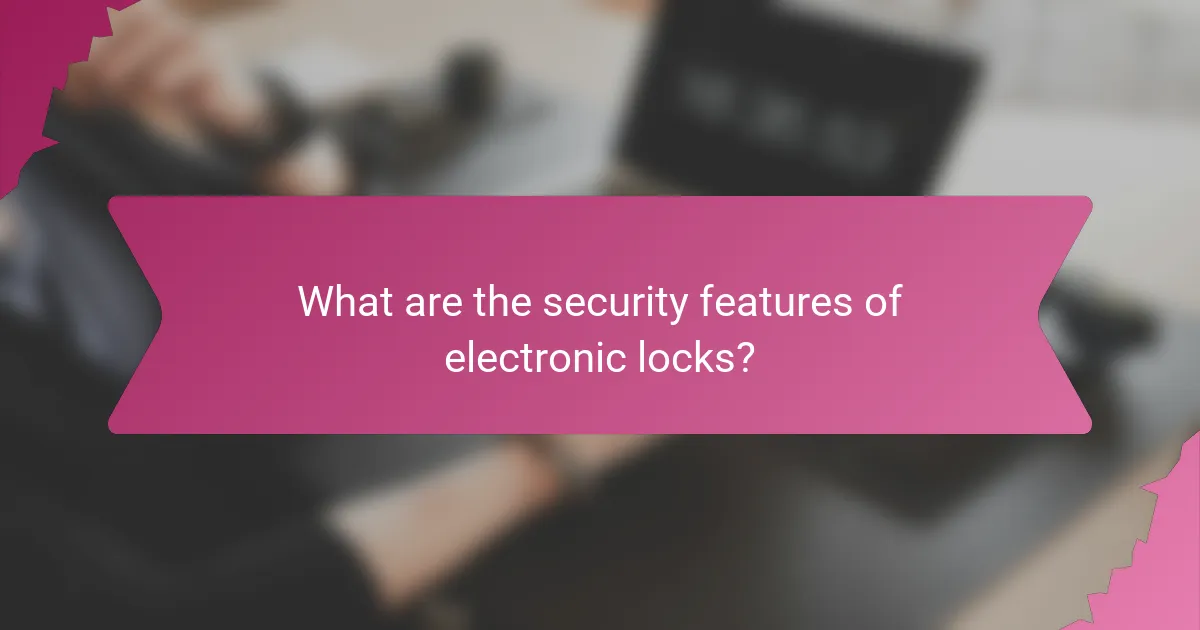
What are the security features of electronic locks?
Electronic locks offer advanced security features that enhance protection compared to traditional mechanical locks. They typically include options like keypad entry, biometric access, and remote monitoring, making them versatile for various security needs.
Keypad and biometric access
Keypad access allows users to enter a numerical code to unlock the door, providing a straightforward method of entry. Biometric access, on the other hand, uses unique physical traits such as fingerprints or facial recognition, adding an extra layer of security by ensuring that only authorized individuals can gain entry.
When choosing between keypad and biometric options, consider the environment. Keypads can be more vulnerable to code sharing, while biometric systems may require maintenance to ensure accuracy and reliability.
Remote access capabilities
Many electronic locks come with remote access features, enabling users to lock or unlock doors from anywhere via a smartphone app. This is particularly useful for granting access to guests or service personnel without being physically present.
When evaluating remote access, check for compatibility with your existing smart home systems and ensure that the lock supports secure encryption to protect against unauthorized access.
Audit trails and monitoring
Electronic locks often include audit trails that log entry and exit times, providing a clear record of who accessed the premises and when. This feature is valuable for businesses and homeowners who want to monitor activity for security purposes.
To maximize the benefits of audit trails, choose a lock that offers easy access to logs and consider how long the data is stored. Regularly reviewing these logs can help identify any unusual patterns or potential security breaches.
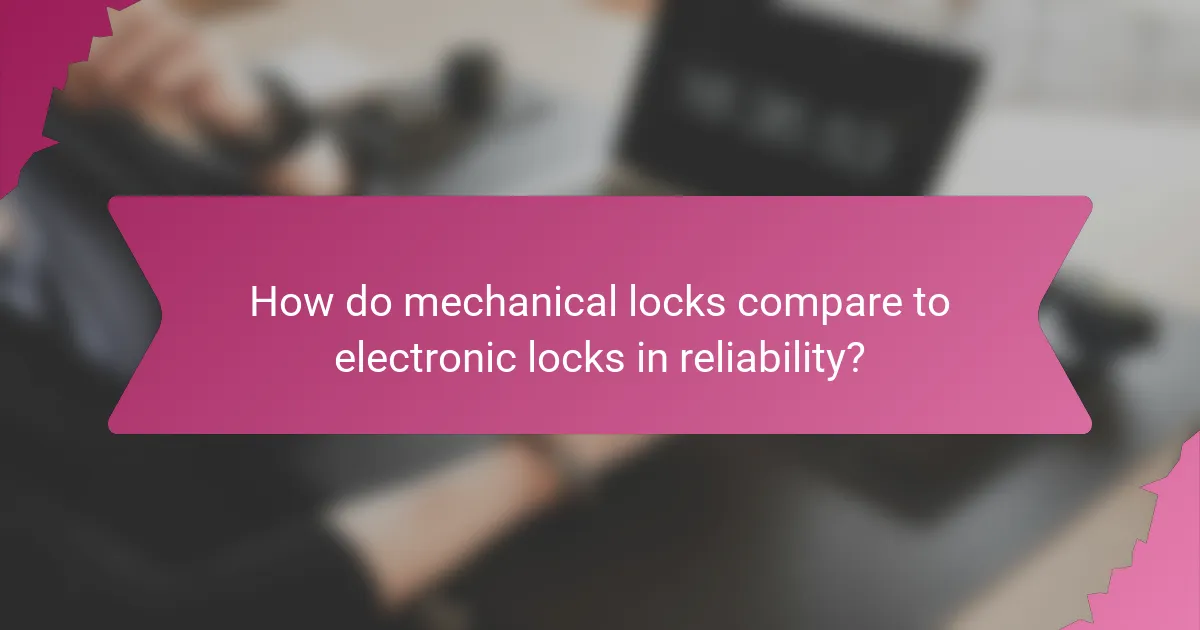
How do mechanical locks compare to electronic locks in reliability?
Mechanical locks generally offer greater reliability than electronic locks due to their simplicity and lack of electronic components. Mechanical systems are less susceptible to failures caused by power outages or technical malfunctions, making them a dependable choice for securing property.
Mechanical locks are less prone to electronic failure
Mechanical locks operate using physical components such as pins and tumblers, which do not rely on electricity. This design minimizes the risk of failure due to power loss or electronic glitches, ensuring consistent performance over time. For instance, a well-maintained mechanical lock can last for many years without significant issues.
In contrast, electronic locks can experience failures due to software bugs, circuit issues, or environmental factors like moisture. These vulnerabilities can lead to lockouts or compromised security, particularly in critical situations where access is needed urgently.
Electronic locks require battery maintenance
Electronic locks typically run on batteries, which must be regularly checked and replaced to ensure functionality. Depending on usage, batteries may last anywhere from several months to a few years. Users should establish a routine for battery replacement to avoid unexpected failures.
Some electronic locks provide low-battery alerts, but relying solely on these notifications can be risky. It’s advisable to keep spare batteries on hand and consider models that offer alternative access methods, such as keypads or physical keys, to mitigate the impact of battery failure.
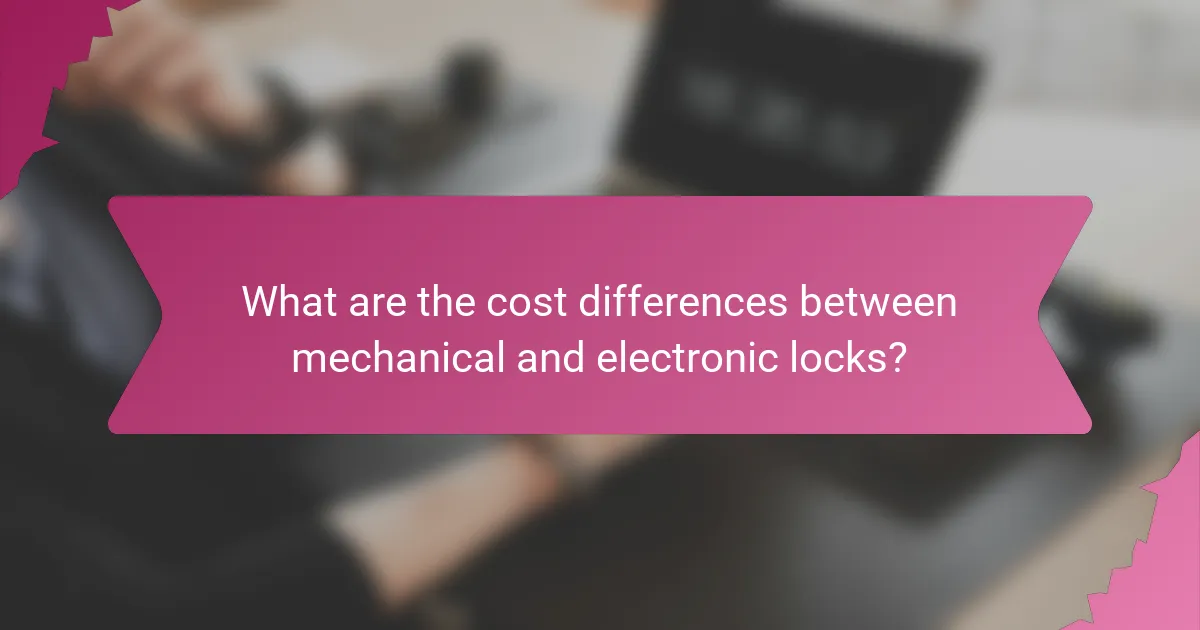
What are the cost differences between mechanical and electronic locks?
The cost differences between mechanical and electronic locks can be significant, affecting both initial purchase and long-term expenses. Mechanical locks typically have a lower upfront cost, while electronic locks may incur additional costs over time due to maintenance and battery replacements.
Initial purchase price of mechanical locks
Mechanical locks generally range from low tens to a few hundred USD, depending on the complexity and brand. Basic deadbolts are often the most affordable, while high-security models can be pricier. Their simplicity and widespread availability contribute to their lower initial costs.
When considering mechanical locks, it’s essential to factor in installation costs, which can vary based on the type of lock and the complexity of the installation. DIY installation can save money, but professional installation may be necessary for high-security options.
Long-term costs of electronic locks
Electronic locks usually have a higher initial price, often starting from a few hundred USD and going up significantly for advanced models. However, long-term costs can include battery replacements, which may be needed every few months to a couple of years, depending on usage and lock type.
Additionally, electronic locks may require software updates or repairs, which can add to their overall cost. It’s wise to consider these factors when evaluating the total investment in electronic locking systems, as they can lead to higher expenses compared to mechanical locks over time.

What factors should be considered when choosing between lock types?
When choosing between mechanical and electronic locks, consider factors such as the usage environment, security needs, and overall reliability. Each type has distinct advantages and drawbacks that can significantly impact your security strategy.
Usage environment and conditions
The environment where the lock will be installed plays a crucial role in the decision-making process. Mechanical locks are often more durable in extreme weather conditions, making them suitable for outdoor use. In contrast, electronic locks may be more vulnerable to moisture and temperature fluctuations, which can affect their performance.
Additionally, consider the frequency of use. High-traffic areas may benefit from electronic locks, which can offer quicker access through keypads or smart devices. However, mechanical locks might be more reliable in environments where power outages are common, as they do not rely on batteries or electricity.
Security needs and risk assessment
Your specific security requirements should guide your choice between mechanical and electronic locks. Mechanical locks generally provide a solid level of security, especially high-quality models with advanced features like anti-picking mechanisms. However, electronic locks can offer enhanced security options, such as remote access control and audit trails, which can be crucial for businesses.
Conducting a risk assessment is essential. Evaluate the potential threats to your property and determine the level of security needed. For instance, if you are securing a high-value asset, an electronic lock with advanced encryption may be worth the investment, while a standard mechanical lock may suffice for lower-risk areas.
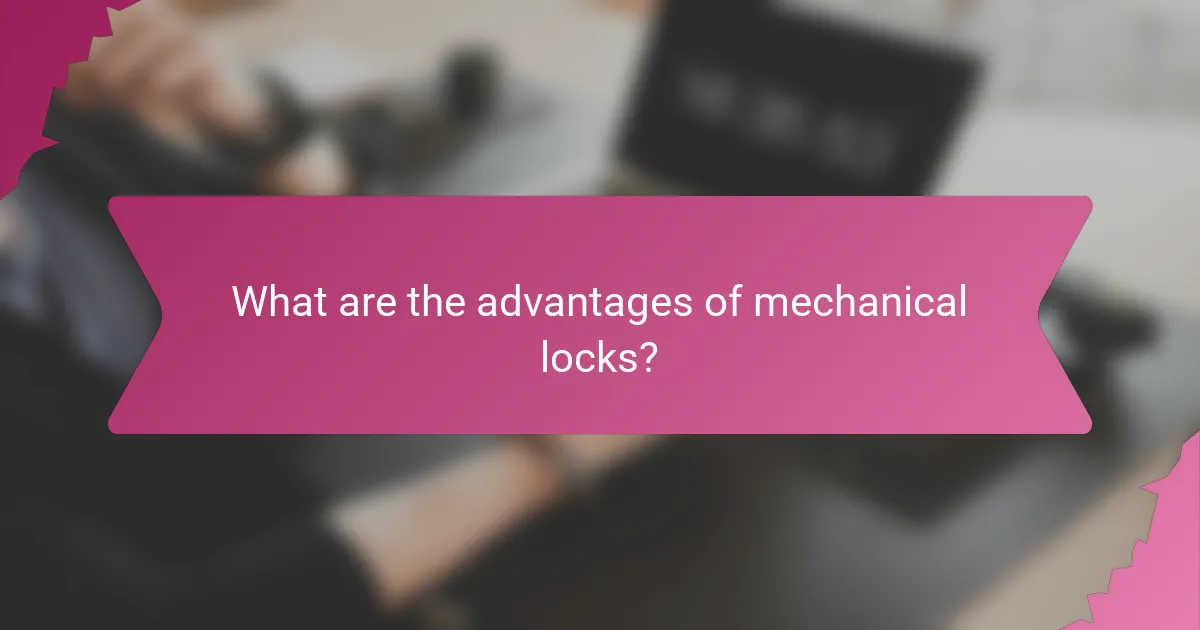
What are the advantages of mechanical locks?
Mechanical locks offer several advantages, including simplicity, reliability, and lower maintenance needs. They are often favored for their durability and cost-effectiveness over time, making them a practical choice for many security applications.
Lower maintenance requirements
Mechanical locks typically require less maintenance than their electronic counterparts. They do not rely on batteries or electronic components, which can fail or need replacement. Regular lubrication and occasional adjustments are usually sufficient to keep them functioning optimally.
In many cases, mechanical locks can last for years without significant issues, making them a dependable option for residential and commercial properties alike. This reliability means fewer service calls and lower long-term upkeep costs.
Cost-effectiveness over time
Mechanical locks are generally more cost-effective over their lifespan compared to electronic locks. While the initial purchase price may be similar, mechanical locks do not incur ongoing costs such as battery replacements or electronic repairs. This can lead to substantial savings over time.
For example, a quality mechanical lock might cost between $50 and $150, while electronic locks can range from $100 to $300 or more. Considering the longevity and minimal maintenance of mechanical locks, they often represent a better investment for budget-conscious consumers.
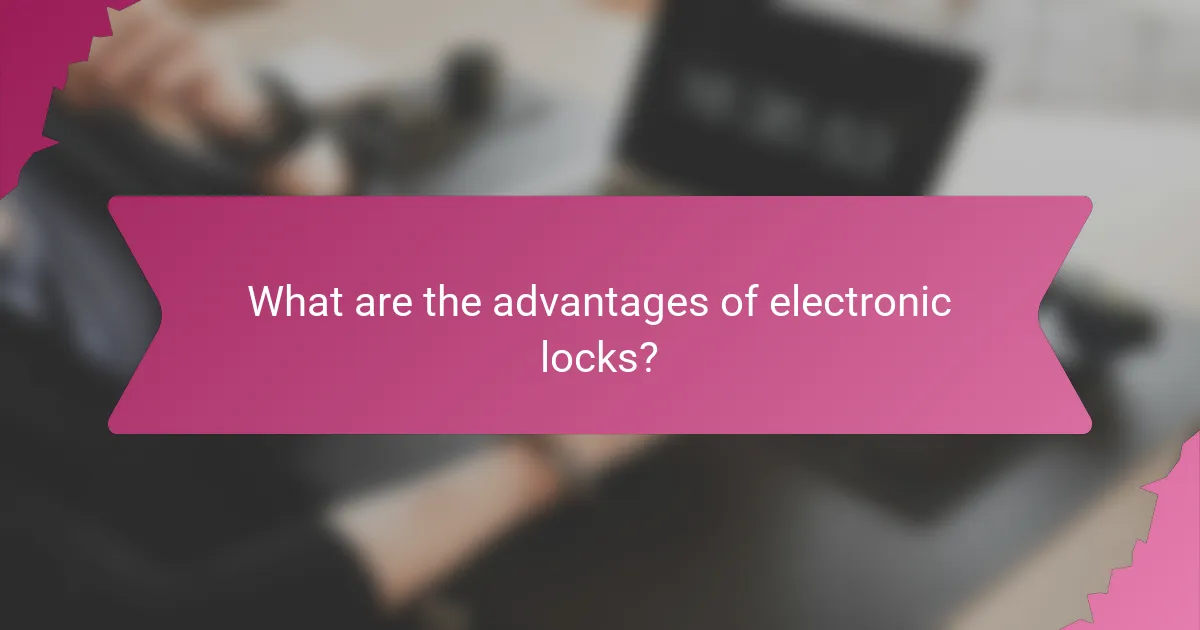
What are the advantages of electronic locks?
Electronic locks offer enhanced security features, convenience, and integration capabilities that traditional mechanical locks cannot match. They allow for keyless entry and can be easily managed through mobile applications or smart home systems.
Convenience of keyless entry
Keyless entry systems eliminate the need for physical keys, allowing users to unlock doors using codes, smartphones, or biometric data. This can be particularly useful for families or individuals who often misplace their keys.
Many electronic locks allow for temporary access codes, which can be shared with guests or service personnel. This feature enhances security by enabling users to grant access without needing to provide a physical key.
Integration with smart home systems
Electronic locks can seamlessly integrate with various smart home systems, enhancing overall home automation. This allows users to control their locks remotely, monitor access, and receive alerts when someone enters or exits.
For instance, a smart lock can be programmed to automatically lock at a certain time or unlock when a user approaches with their smartphone. This level of integration not only boosts convenience but also improves security by ensuring doors are locked when they should be.
